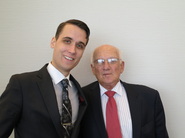
Freedomway.ca
Remember: Please share this article if you find it helpful!
Image: Would you rather have half a watermelon or a whole grape?
According to Robert Kiyosaki, there are 4 types of people in the world: Those who want to be liked, those who want to be comfortable, those who want to be right and those who want to win.
- People who want to be liked are motivated by what others think of them. They don't want to "rock the boat" and want to be everyone's friend.
- People who want to be comfortable are motivated by their comfort level. They don't want to be pushed outside of their comfort zone and want to remain in complete control of their comfort.
- Those who want to be right are motivated by winning arguments and asserting their authority over others. These people will win an argument and don't mind losing a friend in the process.
- Those who want to win are motivated by "winning" and getting what they want in life above all else. These people will lose an argument to win in the long term.
Each one of us wants to be liked, comfortable, right and win, but the question is, which of the 4 types motivates us the most?
In negotiation, business and deal-making, success depends on our desire to "win". Creating win-win situations is the most important skill in negotiating or deal making.
- When negotiating with people who want to be liked, these people will give up key positions just to maintain their likability. This makes people who want to be "liked" bad negotiators, but easy to make deals with.
- When negotiating with people who want to be comfortable, they will never give up positions of comfort and this makes them harder to make a deal with.
- When negotiating with people who want to be right, they will argue over non-critical points until they kill the deal.
- When negotiating with people who want to win, they will do whatever it takes and give up any position just to win the position they need in the negotiation. These types of people make the most effective negotiators.
Mark Cuban has used the following line on the hit TV show Shark Tank many times "What would you rather have? Half a watermelon or a whole grape?"
When negotiating or making a deal, we need to ask ourselves, are we willing to sacrifice some of the things we want so that we can end up with a watermelon and not get stuck with a grape? Negotiation is always a"push and pull" process where the objective is never to obliterate the other side. We have to create win-win situations so that both sides end up sharing a large tasty watermelon.
Unfortunately, we all have personality traits and qualities that can inhibit our ability to negotiate effectively.
We all have the ability to be great negotiators and great deal makers, but unfortunately we also have many opportunities to be deal-killers.
I have identified 11 questions you can ask yourself to find out whether you are a deal maker or a deal-breaker.
13 DIAGNOSTIC DEAL-MAKING OR BREAKING QUESTIONS:
- Is your personal profit on a single deal worth more than the lifetime value of the relationship with the other side? Yes or no?
- Do you take more value than you give? Yes or no?
- When doing a deal, do you try to get something for nothing? Yes or no?
- When negotiating on key points are you looking at the big picture or just the minor details? Are you focused on the forest or the trees?
- Do you need to win every point of a negotiation? Can you give in on less important points?
- Do you care what the other side gets as long as you get what you want?
- How many deals have you done this year?
- Are you easy and pleasant to deal with? Or are you hard and tough to deal with?
- Do you go back on your word? Is your word your bond?
- Will you try to kill a deal that you are not a part of? Will you try to disrupt or block someone else's deal?
- When great opportunities come up, do you get called first to participate? Or do you get called last or not at all?
13 ANSWERS FOR DEAL-MAKING OR BREAKING QUESTIONS:
- Lifetime value is always worth more than personal profit on a single deal. Networks and relationships are always worth more than a single deal. If you are too focused on transactional profit, you may be a deal-killer.
- If you take more value than you give, you are a deal-killer. Deal makers always give the other side much more value than anticipated. Think value, not price.
- If you try to get something for nothing, you are a deal-killer. Nature is based on inputs and outputs, it is impossible to get something for nothing in this world.
- If you are obsessed over the small details of a negotiation and fail to see the big picture, chances are you are a deal-killer. The best deal makers can see the big picture and find flex on small details.
- If you need to win every point in a negotiation, you are absolutely a deal-killer. You are also probably a painful person to deal with.
- You should not care what the other side gets, as long as you get what you want. Someone will always get more than you. Focus on what you want and forget about the other side. This is key in deal-making and in life. Happiness comes from getting what you want, not getting what the other guy gets.
- If you are not doing as many deals as you would like, you are likely thinking like a deal-killer and not a deal-maker. It might be time to change our mindset.
- The number one personality trait for top negotiators and deal makers is personality. If you are not a pleasant and easy person to deal with, then you are likely a deal killer. Personality is #1.
- If you go back on your word, you are a deal killer. Integrity is extremely important in making deals. Get this fixed immediately if it's a problem.
- If you try to disrupt someone else's deal because you are not in it, you are a serious deal killer. Avoid this at all costs. Allow commerce to happen and opportunities will flow towards you.
- If you do not get called first for a deal or business opportunity, chances are, you are a deal-killer. Work on your negotiation and your personality skills to increase your chances of getting the best opportunities first.
Neogitations, business and life are all very simple games. To quote Zig Ziglar "You can get everything in life you want if you will just help enough other people get what they want." Effective negotiation is a skill that revolves around people and people skills. If you can eliminate the 11 ways to kill a deal above, there is no reason why you can't sell more, transact more and have better more fulfilling relationships.
Thanks for reading,
Stefan Aarnio
Freedomway.ca
P.S. Please share this article if you found it helpful!


 RSS Feed
RSS Feed

